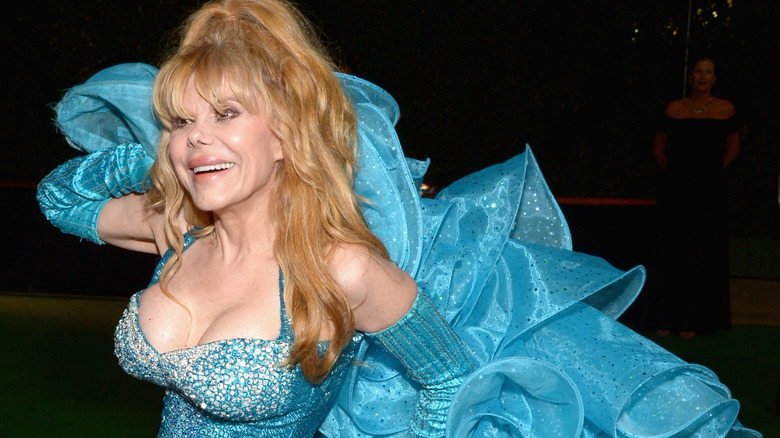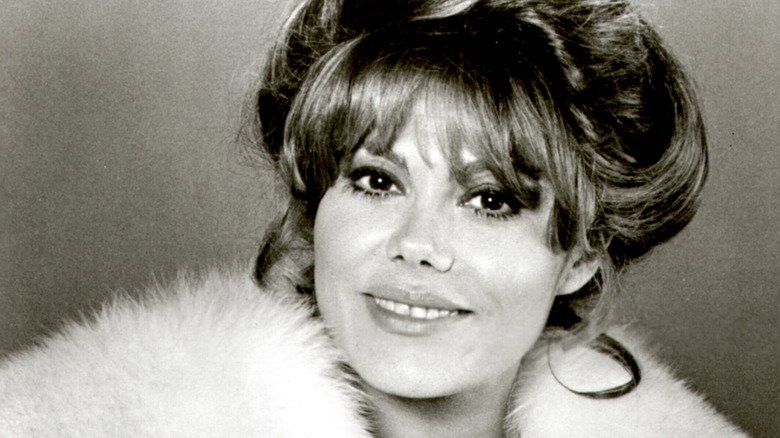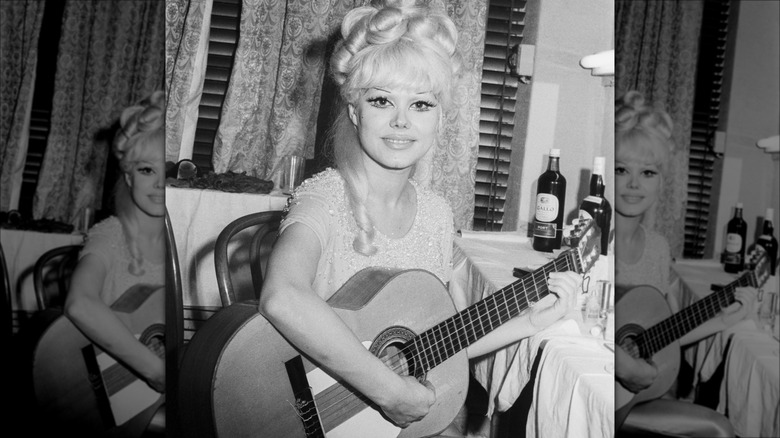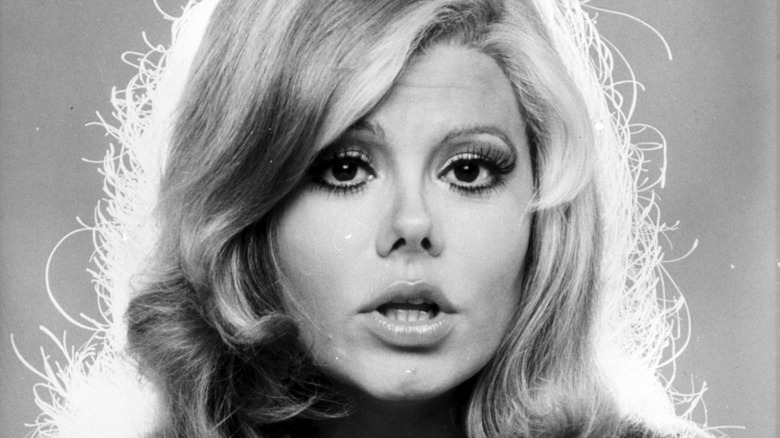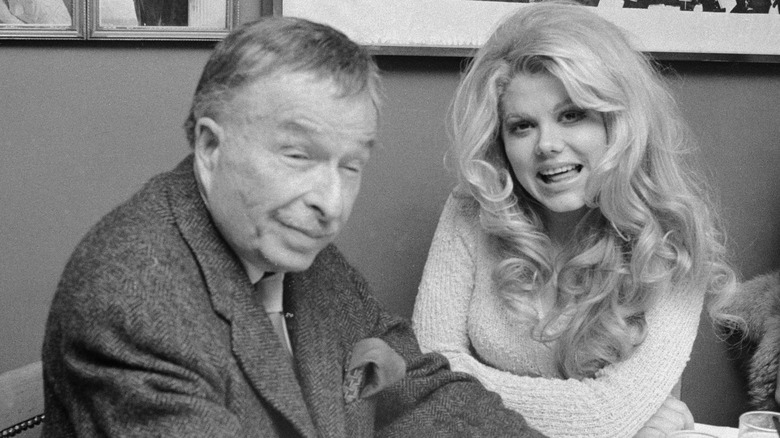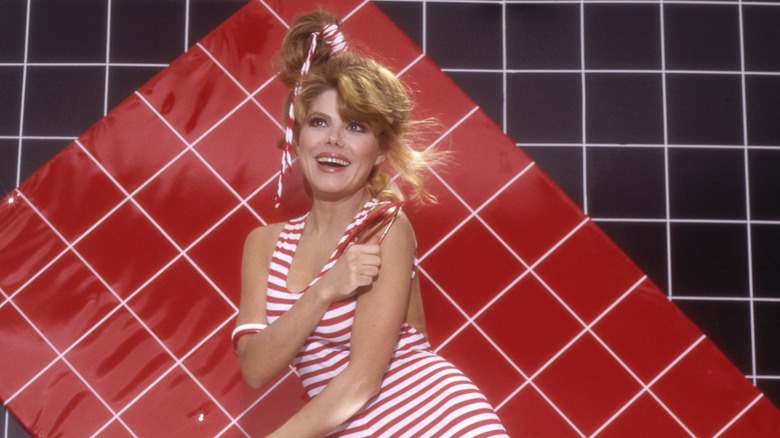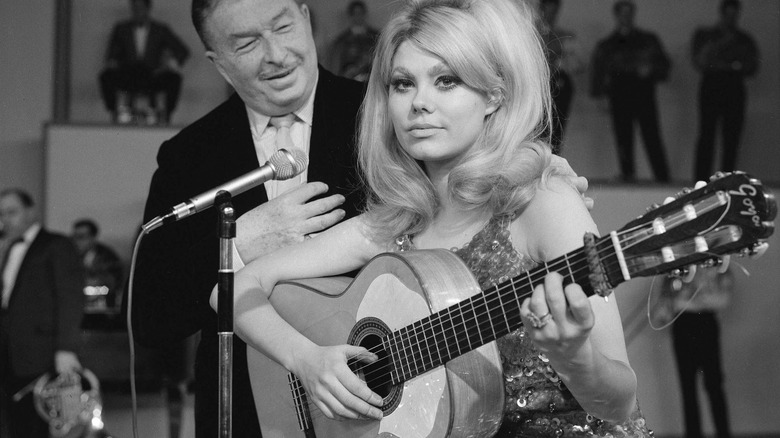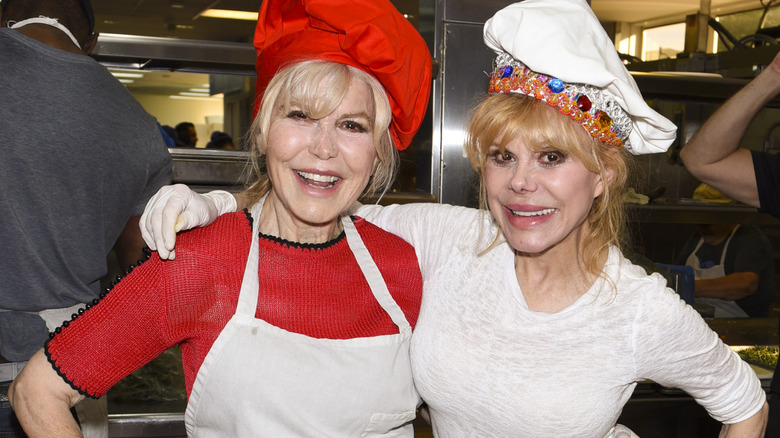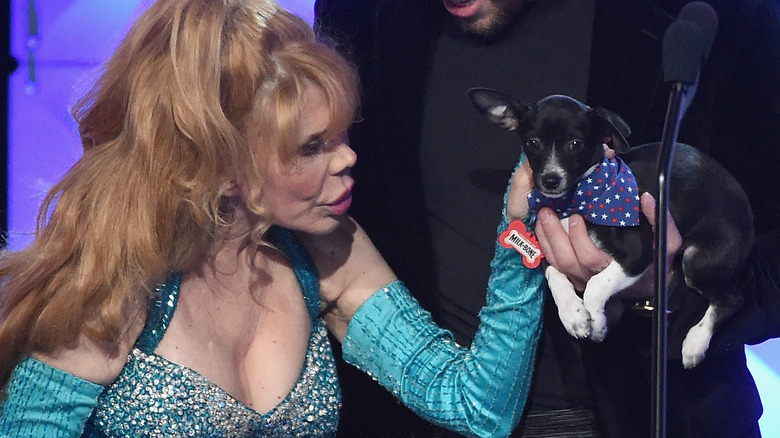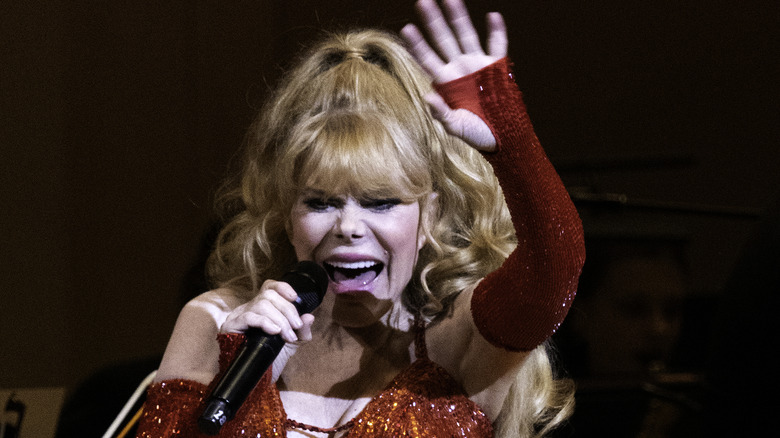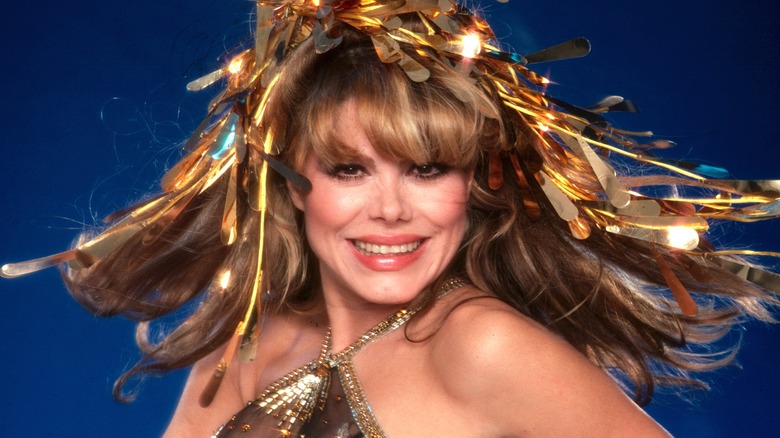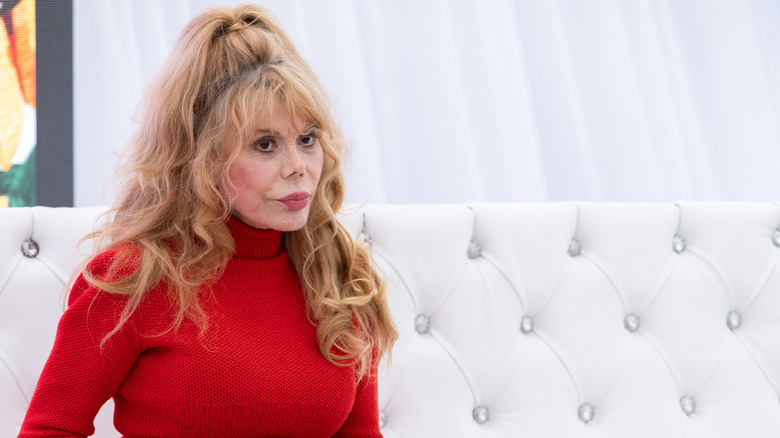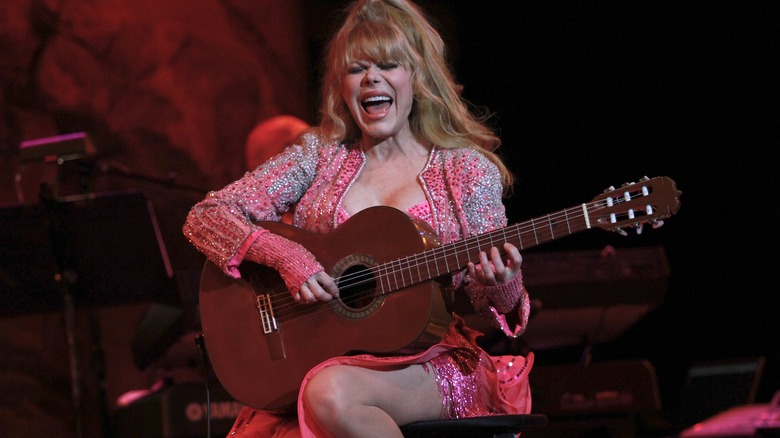The Untold Truth Of Charo
There are some things that will give away a person's age almost immediately: their favorite slang term, how many pairs of Chuck Taylors they've owned in their lifetime, what movie they think of first when they hear the words "Star Wars," and how they know Charo. Some know her as the "cuchi-cuchi" girl from Johnny Carson and the like. Others know her from "Fantasy Island" and "The Love Boat." And others know her from her iconic appearances on "Dancing with the Stars," "Jane the Virgin," and in "Sharknado 5: Global Swarming."
Others know her as an award-winning guitarist, and saying she's an incredible musician is putting it lightly. She's been honored as one of the best flamenco guitarists in the world and lauded for her contributions to Latin music. Listening to her play for just a few minutes explains why she moves the way she does: Clearly, she's the very personification of music, rhythm, and dance.
And here's the thing about Charo: Every part of her life is extraordinary, from her incredibly unconventional upbringing and her childhood struggles to her work as an activist. Even that led her to adopt a very non-traditional pet and get into all sorts of trouble for it... as only Charo can.
She dreamed of a life in America even as a child
Charo was born in an area of southeastern Spain called Murcia, although the year of her birth has been a point of contention, with the date being anywhere between 1941 to 1949. Thanks to a judge, she had it officially declared as 1951. As for her name? That's complicated: "Charo" is short for Rosario, which is just a part of her actual name. That's Maria Rosario Pilar Lorenza Emilia Eugenia Martinez Molina Baeza De La Osa Rasten, and don't worry, that's not going to be on the test later. Her distinctive accent is absolutely real, and she's used it to her benefit — she once told The New York Times, "I get away with murder in my comedy, because I know they're not going to understand me anyway."
The fact that Charo has made a life in America performing and playing guitar is a testament to her determination. To hear her tell her story, she was little more than a toddler when she knew that she wanted to spend her life on the stage — and slightly older, perhaps, when she knew she wanted to cross the ocean for a life in the U.S.
It was a dream she shared with her sister, too. She recalled them playing a game when they were very, very young, pretending to leave their homeland for the States by leaping over a chamber pot sitting on the floor between the beds in their shared room. For her, it was an escape: Her childhood was during an era of Spain's history when they were subjected to the authoritarian rule of a government run by the dictator Francisco Franco.
She credits Romani musicians for her own talent
Everyone has those moments in childhood that shape them as adults, and for Charo, those moments happened during the summers. That's when she would stay with her grandmother, and also staying with her grandmother — camping on her land, to be precise — were Romani families. Charo explained to W that it was this early introduction to their music that captured her heart: "I was watching them play, and it was magic," she said.
Music was in her blood, she told She Shreds. "Although they're all farmers, from both sides, my father and mother, music has been the medicine in my family for centuries. Music is like oxygen." She continued, calling those summers some of the best days of her life and crediting them with teaching her how to live in the moment and appreciate everything around her: "They don't care if the next day they're going to have food, they just welcome the night and the sunset. They play guitar, make a fire, and dance."
She had been so earnestly, honestly fascinated by the guitar that one of her grandmother's Romani guests — a man known as "el faraon," or "pharaoh" — gave her his own instrument before they moved on in their travels. He also showed her how to stretch her fingers to give her the flexibility needed to play.
Her family was exiled by Franco's dictatorship
Charo's happy childhood was short-lived, as her previously well-to-do family was shattered when she was just 7 years old and her father — a lawyer, accountant, and professor — attracted the attention of Spain's fascist government. He was forced to flee the country, presumably sometime in the late 1950s, but that didn't entirely protect the wife and daughters he left behind: The government seized their ancestral farmland. Charo explained to The New York Times, "We were cute little rich girls, full of love, but the good life finished."
She wouldn't see her father for the next decade, and she's been candid about the long-lasting impact that it had on her: "It is a trauma that you never forget. You never know when it will hit you."
Charo turned to the music she'd learned in happier days, saying that her childhood difficulties shaped her approach to success. (She invested heavily in property, for example, because she and her sister promised each other they would never be homeless again.) Her road to stardom really started when she was 9 and auditioned for a spot in guitarist Andrés Segovia's music school. Young and the only girl in class, she says the challenges of her young life gave her strength to face challenges as an adult, even if some of those early experiences still haunt her: "When I have to do a big opening or something important, the night before, I dream that I can see the oranges [on her grandparents' farm], but I cannot grab them," she said.
Charo and Cugat
It was Andrés Segovia who lauded Charo for her natural talents and style when she was 9 years old, and just a few years later, she caught the eye of another musician: Xavier Cugat (pictured), the bandleader who had also mentored a young Desi Arnaz. Today, the events that unfolded around their relationship are more than a little uncomfortable.
The upheaval of her family life may have required Charo to grow up very quickly, but it's still pretty shocking to think that she was in her teens when — with the help of some conveniently placed padding — she says she was able to convince Cugat that she was actually 25. He found out the truth pretty quickly, but still convinced her mother to let her and her sister travel to America with him. She explained to W, "He said, 'I would like to take your daughter to the United States to give it a try. For three months. She's going to make you some money, and she will be protected with a chaperone.'"
That was in 1964, and it's been suggested that the newly divorced, 65-year-old Cugat gave the teenage guitarist a chance partially because of her talent, and partially to spite his now-ex (fourth) wife. Things got serious pretty quickly, and they had a Las Vegas wedding two years later. She would later say the marriage was purely a business move that allowed her to stay in the U.S.
What does cuchi-cuchi mean, anyway?
Charo's first chance to make a splash came very quickly, when she was booked on Johnny Carson's "The Tonight Show." There was, however, a catch: "I didn't understand what he was asking me," she said later. She took a wild guess, though, that it was something sexually suggestive and replied with the words that would turn into her catchphrase: "Cuchi-cuchi!"
No one really needed to know what it meant; it sounded just dirty enough to be funny, and just family-friendly enough to make it onto television. Charo says it has nothing to do with being dirty at all — it had to do with being a lonely child who befriended a very cranky dog. When she was very young, she became best friends with one of her grandmother's dogs. She'd taken him in after he'd suffered a massive spinal injury, and even after nursing him back to health, he continued to walk with a distinctive, hip-swaying gait.
That's what she was mimicking when she jumped from her chair with a wink and a "Cuchi-cuchi!" The dog's name was Cuchillo — which means "knife" — but the young Charo couldn't pronounce it, and he became "Cuchi." "Every time I walked like Cuchillo, the people laughed," she told Vice. "Anything that I did wrong, I can fix it by saying 'Cuchi' and moving like the dog. It was my security blanket."
She was one of the performers censored by Ed Sullivan
Television in the 1960s was quite a bit different than it is today, and Ed Sullivan was so concerned with keeping his namesake show clean and wholesome that when the Rolling Stones appeared in 1964, he famously declared they would never be allowed to perform again. (Spoiler alert: They were.) He regularly asked artists to change lyrics, and they tended to respond in one of a few ways: They made the requested changes, with some meme-worthy eye rolls (the Rolling Stones), they sang whatever lyrics they wanted (The Doors), or they refused to perform (Bob Dylan).
As harmlessly wholesome as she seems, Charo was one of the performers asked to change her lyrics — even though they were in Spanish. When she auditioned and performed "La Cucaracha," she told W that Sullivan demanded that a translator tell him what the lyrics to the song meant. When he realized she was singing about a cockroach that couldn't walk because of "marijuana que fumar," he declared that there definitely weren't going to be references to marijuana on his show. She changed it to "cigarillos que fumar," prompting Xavier Cugat to call Charo's mother: "[He] said, 'She's taking over America, but she's crazy. I cannot control her. She was talking about marijuana to Mister Sullivan.'"
She credits her sister for her success
Calling someone a sister can mean so much more than biology, but sometimes — for those very lucky people — biological sisters grow up to have the kind of honest friendship that others might just dream about. That's the case with Charo and her sister, Carmen Lesher. They went from sharing a room and dreaming of a life in the U.S. to traveling there together, to making it work together.
It's Lesher who designs all of Charo's one-of-a-kind outfits, including the tuxedos she wears when she picks up her guitar, shrugs off the innuendo and the "cuchi-cuchi," and starts to play as only she can. Carmen is also her stylist, and watches her to make sure she's not showing the cameras anything she doesn't want to show them — although Lesher has said that Charo doesn't always listen.
When Charo spoke with Vice, though, it was clear that the love and respect they have for each other runs very deep. Charo explained, "If my sister was less talented, I would not have this luxury. ... We are a team. We are survivors, because we are so well trained. Carmen will always be able to get a job in design. I will always be able to get a job playing guitar. If there are no jobs playing guitar, I can work as a performer. If there are no jobs for performers, then I'm sure we can wash windows."
An odd pet caused some massive conflict
Can Charo get more wholesome? Yes: She loves animals. When she gave The Oprah Winfrey Network an inside look at her Beverly Hills house, she was proud to share the fact that it had been decorated like a traditional Spanish home. She was also thrilled to show off some of the animals that lived there with her, but she was less-than-thrilled about the fact that when it came to her largest pet, her only option was a photo. Why? Her neighbors had such a problem with her pet that she'd been forced to relocate it.
The pet in question was a full-grown bull named Manolo, a creature that Charo had befriended as a calf. They'd met while filming an anti-bullfighting spot for PETA, and that's when she decided to keep him. Perhaps unsurprisingly, city officials got involved when the neighbors started complaining about the smell, and told Charo that Manolo had to go find a new place to live.
Charo did relocate him, but apparently, he returned to Beverly Hills for the occasional visit. That compromise didn't make her any less upset, though, and she told OWN that the only neighbor who was good about it was Jennifer Lopez. "God bless her, she took it," she said. "But the other neighbors did not like it, that we have a bull. So, they called the police and said, 'We smell bull*** from Charo's backyard!'"
There are no old jokes
Watch a beloved comedian enough, and it's almost inevitable that jokes will begin to repeat themselves. Even something that's gut-bustingly funny the first few times around will have a tendency to get old, and when Vice talked to Charo in 2016, she said as much — especially when it's the sort of spur-of-the-moment comedy that she favors. Drop some innuendo, throw in a curse word, and it's funny because it's unexpected. When it's played over and over? Not so much.
Knowing that — and being determined to avoid the pitfalls of being bland or repetitive — means that Charo puts a shocking amount of work into her stage shows, which are part comedy, part dance, and part music. It's the comedy part that makes for some rigorous prep: For every show, she writes new material a day in advance. She says she's inspired by current events and notes that it's important to her that her comedy is never cruel... at least, not to others. "My greatest fun is attacking me," she said. "I don't like to write jokes where you are actually offending people."
No, she doesn't like the way she's been stereotyped
For those who just know Charo as the "cuchi-cuchi" girl, shame! In an interview with She Shreds, Charo spoke about how she became known as little more than a catchphrase, a jiggle, and a charming but clueless figure: "When I came to America, it was very make it or break it," she said. "Overnight, America found 'cuchi-cuchi,' and that is the character that became so powerful. For me, cuchi-cuchi means money. Not only that, it saved me. And then we had a problem. Cuchi-cuchi took over the real me: my preparation, my knowledge, my guitar, my education. I became an idiot."
Charo was a musician first, and after years of dedicating her life to her passion and her craft, she was devastated when she found that record companies were interested in putting out her music — and all that anyone wanted was the airheaded woman in the tight clothing. She told W, "I said, 'But when I close my eyes or I look into the mirror, I see my mother working, my grandmom digging in the soil, my aunt doing embroidery.' ... I don't want to lose respect for myself."
So, she put out records, and her "Guitar Passion" peaked at No. 21 on Billboard's charts in 1994. She told Vice that the second half of her stage shows — where she dons a tuxedo designed by her sister, and picks up her guitar to perform — is truly her.
She spoke out on the subject of mental health after an unthinkable tragedy
When Vice talked to Charo in 2016, she was still head-over-heels in love with her husband, Kjell Rasten. They married in 1978, and she said, "I have no scandals. [Rasten] is my affair. ... We are still having fun and planning to be together for hopefully a long, long time on this planet." Then, in February 2019, Charo confirmed that he had died by suicide. In her official statement, she revealed that he had been struggling with depression, was in failing health, and had been diagnosed with the rare skin condition bullous pemphigoid. That, says the Cleveland Clinic, is an autoimmune disease that causes the development of itchy blisters on folds of the skin (like the armpit) and mucous membranes (like the mouth), which can break open to form ulcers.
It was Charo who found him; she told The New York Times that she had been looking for him, singing, "Good morning, good morning!" when she made the awful discovery. After his death, she said, "I was empty." Despairing, she locked herself in her bedroom and stayed there for a month.
She also took the announcement of his death as a chance to ask: "Please, if anyone you know and love is suffering from depression or illness, hold them close, tell them you love them with all your heart and that the world is better because they are in it."
If you or someone you know is struggling or in crisis, help is available. Call or text 988 or chat 988lifeline.org
Her music keeps her going
Seven months after her husband died by suicide, Charo spoke with She Shreds for a candid interview about what had kept her going. For starters, there was nature and quiet solitude. A period of soul-searching and introspection brought her to the realization that although she continued to heal from a devastating tragedy, she still had a purpose: "I want to talk to children, because what happened to me, I hope will never happen to anyone. ... And I'm using the tragedy in my life to save lives."
She spoke, too, about the obligation that came with being able to make a living as a performer, and that was to make people happy. She's seen just how powerful laughter can be, especially when it's shared. While she's not thrilled to be forever identified with "cuchi-cuchi," she knows that it makes people laugh, and she knows that's important.
When asked what she hoped her legacy would be, her answer was revealing. She said that she hoped to be remembered as a comedian who made people laugh, a musician who moved people with her music, and a person who had nothing but respect for others and a desire to make them happy. "Because when the curtain opens, I am so happy, but when the curtain closes, I am not happy," she said. "I'm not happy because I don't have a beautiful man, laughing and hugging me. I don't have that anymore. And that is the truth."
